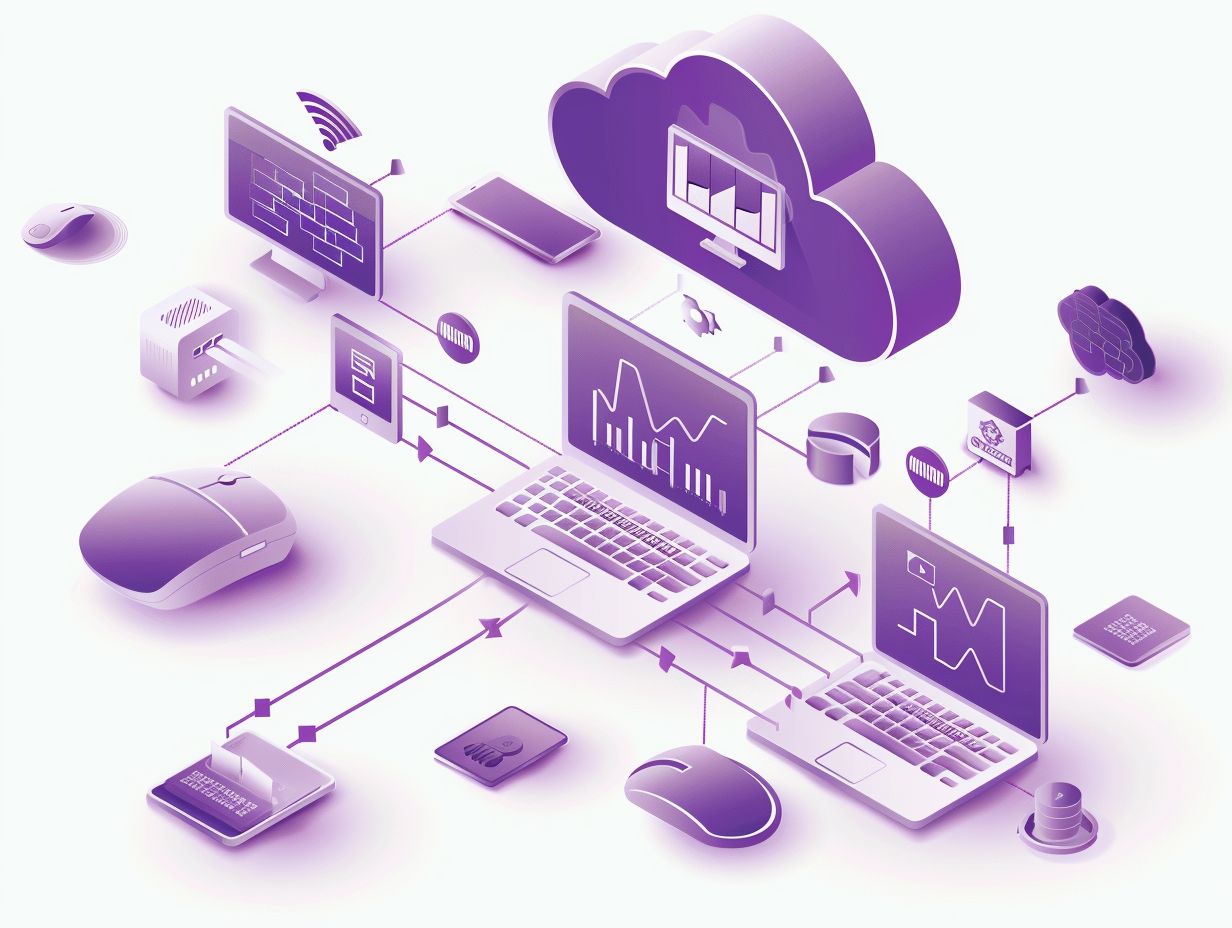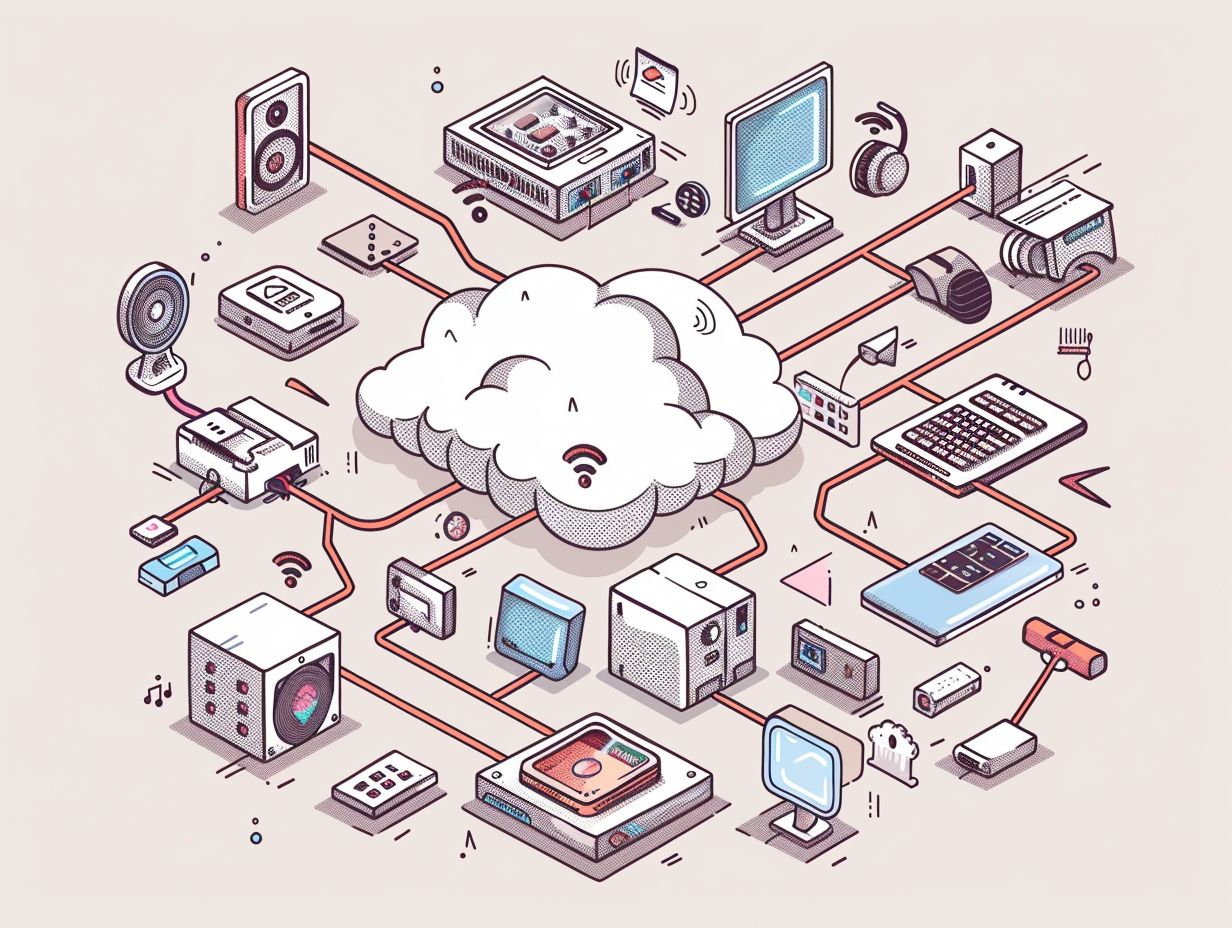If you are interested in learning about the fundamental concepts of cloud computing for CCNA certification, this article will provide valuable insights. The discussion covers the definition and basic concepts of cloud computing, highlighting benefits such as efficiency, cost savings, scalability, and flexibility.
Various types of cloud computing are explored, including public, private, and hybrid clouds, along with different cloud computing models like Infrastructure as a Service (IaaS), Platform as a Service (PaaS), and Software as a Service (SaaS).
Key considerations and best practices for cloud computing security are also presented to enhance your understanding of this essential topic. By delving into these concepts, you can deepen your knowledge and preparation for CCNA certification.
Key Takeaways:

Definition and Basic Concepts
Cloud computing refers to the delivery of computing services, including servers, storage, databases, networking, software, and analytics, over the Internet to offer faster innovation, flexible resources, and economies of scale to you. This technology allows users to access and store data and applications over the internet instead of on physical servers or personal devices.
This model, supported by the National Institute of Standards and Technology (NIST), has transformed the way businesses operate by providing on-demand access to a shared pool of configurable resources for you. Servers in the cloud enable the processing and storage of data, while networking services facilitate communication between different components. The storage aspect ensures data persistence and availability, ensuring businesses can securely store and retrieve information when needed by you. By adhering to established technology standards, cloud computing ensures interoperability and compatibility across different platforms and services for you.
Benefits of Cloud Computing
The benefits of cloud computing extend to both businesses and customers, offering access to a diverse array of resources and services, improved storage capacities, effective utilization of computing resources, and exceptional flexibility in accommodating evolving business requirements.
Efficiency and Cost Savings
Cloud computing offers you significant efficiency gains and cost savings by optimizing resource utilization, ensuring compliance with Service Level Agreements (SLAs), providing guarantees for Quality of Service (QoS), and managing bandwidth efficiently. This technology ensures that the agreed-upon SLAs are met, guaranteeing high system availability and reliability. QoS standards prioritize critical applications, ensuring smoother operation and an enhanced user experience. By leveraging cloud infrastructure, businesses can scale resources up or down based on demand, eliminating the need for costly hardware investments. Bandwidth optimization reduces latency and enhances overall network performance, making data transfer more seamless and cost-effective for organizations of all sizes.
Scalability and Flexibility
Scalability and flexibility are essential advantages of cloud computing. This technology allows businesses to adjust computing resources based on demand, ensuring optimal resource allocation and swift adaptation to changing requirements.
The dynamic scaling capability of cloud computing is particularly vital for cost optimization, enabling organizations to tailor their resource usage to current needs and avoid unnecessary expenses. The flexibility offered by cloud services permits companies to promptly respond to market fluctuations, technological advancements, and spikes in demand without the burden of managing physical servers.
By utilizing these features, businesses can enhance their agility and competitiveness in the fast-paced digital environment of today.
Types of Cloud Computing

Cloud computing encompasses various deployment models, such as public cloud, private cloud, and hybrid cloud, each providing unique network configurations, Virtual Network Functions (VNFs), and operational benefits.
Public, Private, and Hybrid Clouds
You have a variety of cloud options to consider for your enterprise needs. Public, private, and hybrid clouds each cater to different requirements. Public clouds offer shared resources accessible over the internet, while private clouds provide dedicated resources for individual entities. Hybrid clouds, on the other hand, combine on-premises infrastructure with cloud services through a Wide Area Network (WAN).
Opting for public cloud solutions can be beneficial for cost-conscious businesses as they operate on a shared infrastructure model. This setup allows companies to adjust resources as necessary without the need for significant upfront investments. In contrast, private clouds are favored by organizations with strict data privacy requirements. These clouds offer more control and security over sensitive information.
Hybrid cloud solutions act as a bridge between on-premises infrastructure and cloud services, offering flexibility for businesses to seamlessly use both environments. This setup optimizes resource allocation and boosts operational efficiency across the board.
Cloud Computing Models
In cloud computing, distinct service models are available to meet various needs. These models include Infrastructure as a Service (IaaS), Platform as a Service (PaaS), and Software as a Service (SaaS), each designed to address specific requirements related to infrastructure, platform, and software.
Infrastructure as a Service (IaaS)
Infrastructure as a Service (IaaS) allows you to access virtualized computing resources over the internet, such as virtual machines, storage, and networking components, without the requirement of managing physical servers or data centers. This model offers the flexibility for businesses to dynamically scale their infrastructure, adjusting resources as necessary without being restricted by physical hardware. Through the utilization of server virtualization, companies can enhance resource utilization, leading to cost-efficiency and improved productivity. Virtual machines can be easily provisioned and managed, providing flexibility in deploying applications and services.
By adopting IaaS, organizations can direct their focus towards innovation and expansion instead of dedicating time to server management tasks. The centralized nature of data center efficiency in IaaS further strengthens security, reliability, and accessibility for users.
Platform as a Service (PaaS)
Platform as a Service (PaaS) provides you, as a developer, with a cloud-based environment where you can build, test, and deploy applications without the burden of managing the underlying infrastructure components. This streamlined approach to application development and deployment is made possible by the convenience of PaaS.
When you utilize PaaS, you can make use of pre-configured development tools, middleware, and databases that the platform offers. This allows you to dedicate more time to coding and less time to setting up and maintaining the technology stack.
The collaborative nature of this model fosters teamwork among your team members by consolidating the development workflow. It facilitates activities like version control, continuous integration, and automated testing. Additionally, PaaS solutions support seamless integration with APIs, enableing you to incorporate external services and tools into your applications, thereby enhancing functionality with cutting-edge features.
Software as a Service (SaaS)

Software as a Service (SaaS) delivers applications over the internet on a subscription basis, allowing you to access and utilize software services without the necessity for local installation, maintenance, or management. This model not only simplifies software delivery but also provides a cost-effective solution for businesses of all sizes.
By paying a regular subscription fee, you can benefit from continuous updates, upgrades, and technical support without the complexities associated with traditional software implementations. The flexibility of SaaS allows for straightforward scalability, enableing you to adjust your usage levels to meet changing requirements.
The cloud-based nature of SaaS guarantees that applications are reachable from any device with an internet connection, fostering efficiency and collaboration among users.
Cloud Computing Security
Ensuring cloud computing security is crucial for safeguarding your data and infrastructure. It necessitates careful consideration of key factors and adherence to best practices to minimize risks, maintain compliance, and safeguard sensitive information from cyber threats.
Key Considerations and Best Practices
When implementing robust security measures in cloud computing, you need to adhere to Service Level Agreements (SLAs), data protection protocols, encryption standards, and proactive threat management strategies to safeguard sensitive data and ensure operational continuity.
Ensuring SLA compliance is crucial as it defines the agreed-upon level of service between the cloud service provider and you, outlining responsibilities and expectations. Data encryption provides an additional layer of security, preventing unauthorized access to information stored on the cloud. Plus these measures, implementing threat prevention techniques such as firewalls, intrusion detection systems, and regular security audits can help mitigate risks and protect you against cyber threats.
Frequently Asked Questions
What is cloud computing?
Cloud computing is the delivery of computing services, including servers, storage, databases, networking, software, analytics, and intelligence, over the internet. This allows organizations to access and use these resources on a pay-per-use basis, rather than having to invest in and maintain their own physical infrastructure.
What are the benefits of cloud computing?

There are many benefits of cloud computing, including cost savings, scalability, flexibility, reliability, and security. By using cloud services, organizations can reduce their IT costs, easily adjust their resources based on demand, access their data and applications from anywhere, ensure high uptime, and rely on the security measures provided by the cloud provider.
What is the difference between public, private, and hybrid cloud?
A public cloud is a cloud infrastructure that is owned and operated by a third-party provider and is available for use by the general public. A private cloud, on the other hand, is a cloud environment that is dedicated to a single organization and is not shared with others. A hybrid cloud combines both public and private cloud elements, allowing organizations to take advantage of the benefits of both.
What is the role of virtualization in cloud computing?
Virtualization is a key component of cloud computing. It allows for the creation of virtual machines that can run multiple operating systems on a single physical server. This leads to better utilization of resources, increased flexibility, and easier management of cloud environments.
How does cloud computing impact network architecture?
Cloud computing has a significant impact on network architecture. With resources and applications being accessed over the internet, network design and security measures need to be adapted to ensure proper connectivity and protection. This can include elements such as multiple network connections, load balancing, and network segmentation.
How can CCNA professionals benefit from understanding cloud computing concepts?
CCNA professionals can benefit from understanding cloud computing concepts as it is becoming an increasingly important aspect of modern networking. With the rise of cloud technologies, it is crucial for networking professionals to have a solid understanding of how cloud computing works and how it can impact their network design and management. This knowledge can also open up new career opportunities in cloud computing roles.
